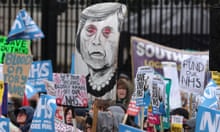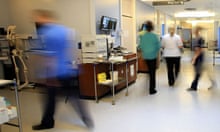The number of EU nationals registering as nurses in England has dropped by 92% since the Brexit referendum in June, and a record number are quitting the NHS, it can be revealed.
The shock figures have prompted warnings that Theresa May’s failure to offer assurances to foreigners living in the UK is exacerbating a staffing crisis in the health service.
Only 96 nurses joined the NHS from other European nations in December 2016 – a drop from 1,304 in July, the month after the referendum.
At the same time, freedom of information responses compiled by the Liberal Democrats from 80 of the 136 NHS acute trusts in England show that 2,700 EU nurses left the health service in 2016, compared to 1,600 EU nurses in 2014 – a 68% increase.
The haemorrhaging of foreign staff is being blamed by the Royal College of Nursing (RCN) on the failure of the government to provide EU nationals in the UK with any security about their future. May has claimed that Britain cannot act unilaterally to guarantee residency as it would weaken her hand in the coming article 50 negotiations over Brexit.
Janet Davies, chief executive and general secretary of the RCN, said the government’s tactic was backfiring, and now threatened the sustainability of the health service.
“The government risks turning off the supply of qualified nurses from around the world at the very moment the health service is in a staffing crisis like never before,” she said. “As she pulls the trigger to begin negotiations, the prime minister must tell EU nurses and those in other occupations that they are needed and welcome in the NHS. Sadly, it is no surprise that EU staff are leaving – they have been offered no security or reassurance that they will be able to keep their jobs. Few are able to live with such uncertainty.
“The government has failed to train enough British nurses and cannot afford to lose the international workforce on which the NHS so heavily relies.”
There are an estimated 57,000 EU nationals working for the NHS, including 10,000 doctors and 20,000 nurses. On Saturday the Liberal Democrats passed a motion at their spring conference in York calling for a guaranteed right to live and work in the UK for all EU citizens working in the NHS and care services.
The former Lib Dem health minister Norman Lamb said that the government’s attitude to EU nationals in the UK was “deeply damaging”, and that the creation of a so-called “NHS passport” could be a vital step. “These shocking figures show you can’t have a strong NHS and a hard Brexit,” he said. “The government’s refusal to guarantee that nurses from the EU can stay here is not only morally unjustifiable, it is deeply damaging for the NHS.
“Theresa May must urgently give EU nationals the certainty they need before we see an even bigger exodus of nurses on whom our health service relies.”
Joan Pons Laplana, a Spanish national and a senior nurse at the James Paget Hospital in Great Yarmouth, who came to the UK 17 years ago, told the Observer that he had personally witnessed the collapse in morale of foreign nurses.
“Since Brexit, I feel like a second-class citizen,” he said. “My son asked me if I was going to be forced back to Spain and my daughter doesn’t want to visit her grandparents because she fears I will not be able to come back.
“The UK is no longer the first choice for EU nurses. The uncertain future means many they are starting to leave. We are people with feelings, not a commodity at the Brexit table.”
The NHS is already under pressure because of a long-term failure to hire enough people. Applications for nursing courses plummeted by almost a quarter in a year after the government axed bursaries for trainees in 2016. Numbers fell by 9,990 to 33,810 in 12 months, according to figures released in February by the university admissions service Ucas. Meanwhile, one in three nurses is due to retire in the next 10 years and there are 24,000 nurse jobs unfilled, RCN figures show.
The Department of Health said: “While the stock of nurses is broadly stable, some of the changes described are owing to the introduction of more rigorous language testing. The secretary of state has repeatedly said that overseas workers form a crucial part of our NHS and that we value their contribution immensely.
“We continue to invest in the frontline, with 13,400 more nurses on our wards since May 2010 and over 52,000 nurses in training.”









